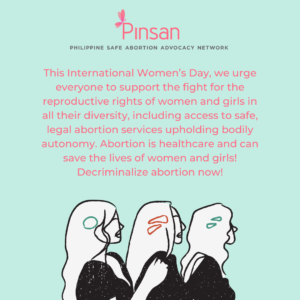08 Mar Access to safe and legal abortion, sexual and reproductive health information is a human right
2023 International Women’s Month
Technology, apps, and digital innovation towards gender equality, safe abortion, and #SRHR4ALL
Access to safe and legal abortion, sexual and reproductive health information is a human right
Access to information, innovation and technology is pivotal for the empowerment of women and girls in claiming and upholding their right to life-saving abortion services. But while more people across the world utilize mobile and ICT tools than clean water and energy, the SRH needs of women and girls are being left behind because of unfavorable conditions pertaining to their gender roles, employment, education and income.
Entering 2014, the Philippine population hovered over 101 million. That same year, the country logged over 130 mobile phone subscribers, according to numbers provided by the Philippine Statistics Authority. To further stress, Meltwater reports that 68% of the total Philippine population spends 10 hours and 27 minutes using the internet. Only 49.8% of the total percentage are female, while 50.2% are male, and 48% of the users are from the rural areas compared to 52% from the urban population. Results of another survey revealed that 53% out of 950 respondents (between 12 – 17 years old) encounter slow connection or poor signal where they live, while 22% say that internet fee or mobile data is too expensive.
Despite the impact of digital technology, those who are marginalized due to gender, race, sexual orientation, gender identity and expression, origin, and disability, do not have access to innovation in a variety of ways, from design to consumption. In fact, in a 2017 CHED report, just two in seven engineering students in the Philippines are women. Of all students taking IT-related courses, only 41% are women, and out of all STEM program enrollees, only 43% are women.
These are lived realities of women and girls in all their diversity while also their sexual and reproductive rights are being diminished and discriminated against.
In fact, life-saving abortion, as a crucial part of women and girls’ SRHR, remains stigmatized and restricted in the country, and access to basic healthcare services continues to be a major challenge in the Philippines, with 50% of the population not having access to primary healthcare facilities within 30 minutes.
Evidently, SRHR in the Philippines stands against not just the gross lack of reproductive health services and access to information, but also the compounded barriers brought by anti-people and profit-oriented social, health and economic policies that further widens the gap for women and girls in all their diversity to access life-saving services.
The labors of women and girls are innumerable and heavy, and among their unnecessary burdens is having to cope with the emotional, mental, and physical stress brought upon by the lack of access to safe abortion. Countless women and girls carrying unplanned, mistimed, and unwanted pregnancies are trapped in undesirable situations with little to no options.
In 2020, 1.26 million Filipino women and girls induced abortion [5], and far too many of these procedures took place in unsatisfactory conditions. The continued denial of access to safe abortions is a clear disregard of women and girls’ fundamental rights including the rights to life, health, to enjoy the benefits of scientific progress, and to be free from torture and ill-treatment which are guaranteed and protected by the Philippine Constitution and international human rights treaties that the Philipines is a party to.
While clamor for more progressive abortion laws grows stronger, the highly sexist and backward views on the matter persist among our nation’s lawmakers, and is evidenced by the government’s inability to acknowledge the right to abortion as a fundamental right to health.
To reiterate, it must be understood that SRHR is an important part of all people’s human rights and development; it is inextricably linked to social justice issues such as access to information, inaccessible education, and poverty among others; and a crucial part to the fulfillment of universal health coverage.
Reproductive rights including access to safe, legal abortion services, upholding bodily autonomy and determination of life outcomes is a human right.
Therefore, this International Women’s Day, we urge everyone to support the fight for the rights of women and girls in all their diversity, and to join the call to decriminalize abortion in the country.
Abortion is healthcare and can save the lives of women and girls! Decriminalize abortion now!
#IWD2023
#InternationalWomensDay
#SRHR4All
#DecriminalizeAbortionNow
References:
[1] UNESCO, (2013). Doubling digital opportunities: Enhancing the inclusion of women and girls in the information society: A report by the Broadband Commission Working Group on Broadband and Gender .https://www.unwomen.org/en/docs/2013/9/doubling-digital-opportunities-women-and-girls-in-it
[2] Amurthalingam, S. (2023, February 20). Social Media Statistics in the Philippines [2022]. Meltwater. https://www.meltwater.com/en/blog/social-media-statistics-philippines
[3] Statista. (2022, September 6). Main difficulty in accessing the internet Philippines 2021. https://www.statista.com/statistics/1315608/philippines-main-problems-in-accessing-the-internet/
[4] Flores, L. J. Y., Tonato, R. R., Paz, G. a. D., & Ulep, V. G. T. (2021). Optimizing health facility location for universal health care: A case study from the Philippines. PLOS ONE, 16(9), e0256821. https://doi.org/10.1371/journal.pone.0256821
[5] Pinsan | PINSAN demands president keep promises – defend women’s rights and decriminalize abortion. (n.d.).

